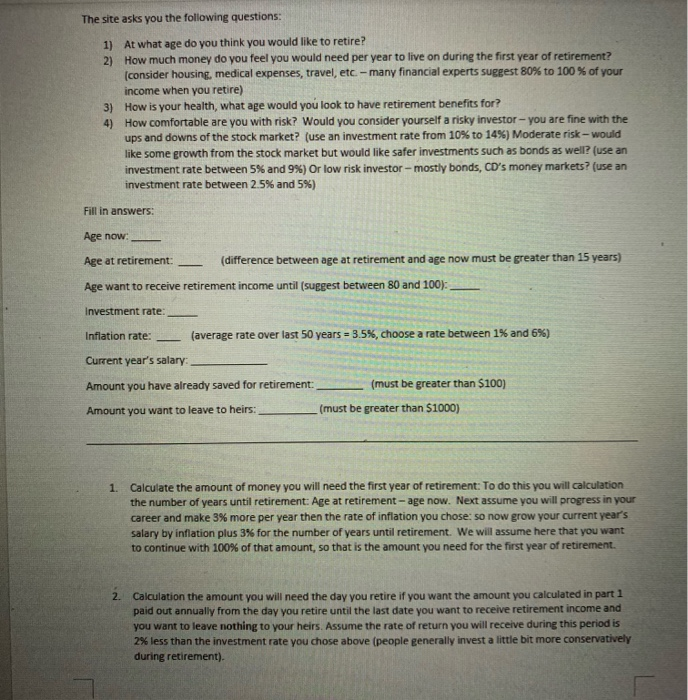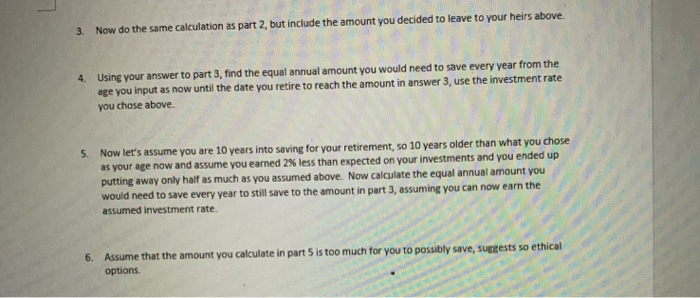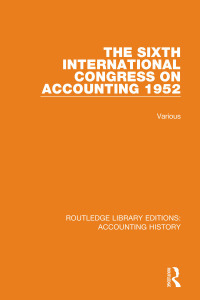how to do five and six? please provide calculation . so, I can understand better 

The site asks you the following questions: 1) At what age do you think you would like to retire? 2) How much money do you feel you would need per year to live on during the first year of retirement? (consider housing, medical expenses, travel, etc. - many financial experts suggest 80% to 100 % of your income when you retire) 3) How is your health, what age would you look to have retirement benefits for? 4) How comfortable are you with risk? Would you consider yourself a risky investor - you are fine with the ups and downs of the stock market? (use an investment rate from 10% to 14%) Moderate risk-would like some growth from the stock market but would like safer investments such as bonds as well? (use an investment rate between 5% and 9%) or low risk investor-mostly bonds, CD's money markets? fuse an investment rate between 2.5% and 5%) Fill in answers: Age now Age at retirement: (difference between age at retirement and age now must be greater than 15 years) Age want to receive retirement income until (suggest between 80 and 100): Investment rate Inflation rate: (average rate over last 50 years = 3.5%, choose a rate between 1% and 6%) Current year's salary: Amount you have already saved for retirement: (must be greater than $100) Amount you want to leave to heirs: _ _(must be greater than $1000) 1. Calculate the amount of money you will need the first year of retirement: To do this you will calculation the number of years until retirement: Age at retirement-age now. Next assume you will progress in your career and make 3% more per year then the rate of inflation you chose: so now grow your current year's Salary by inflation plus 3% for the number of years until retirement. We will assume here that you want to continue with 100% of that amount, so that is the amount you need for the first year of retirement 2. Calculation the amount you will need the day you retire if you want the amount you calculated in part 1 paid out annually from the day you retire until the last date you want to receive retirement income and you want to leave nothing to your heirs. Assume the rate of return you will receive during this period is less than the investment rate you chose above (people generally invest a little bit more conservatively during retirement) 3. Now do the same calculation as part 2, but include the amount you decided to leave to your heirs above. couple 4. Using your answer to part 3, find the equal annual amount you would need to save every year from the age you input as now until the date you retire to reach the amount in answer 3, use the investment rate you chose above 5. Now let's assume you are 10 years into saving for your retirement, so 10 years older than what you chose as your age now and assume you earned 2% less than expected on your investments and you ended up putting away only half as much as you assumed above. Now calculate the equal annual amount you would need to save every year to still save to the amount in part 3, assuming you can now earn the assumed investment rate. 6. Assume that the amount you calculate in part 5 is too much for you to possibly save, Suitests so ethical options The site asks you the following questions: 1) At what age do you think you would like to retire? 2) How much money do you feel you would need per year to live on during the first year of retirement? (consider housing, medical expenses, travel, etc. - many financial experts suggest 80% to 100 % of your income when you retire) 3) How is your health, what age would you look to have retirement benefits for? 4) How comfortable are you with risk? Would you consider yourself a risky investor - you are fine with the ups and downs of the stock market? (use an investment rate from 10% to 14%) Moderate risk-would like some growth from the stock market but would like safer investments such as bonds as well? (use an investment rate between 5% and 9%) or low risk investor-mostly bonds, CD's money markets? fuse an investment rate between 2.5% and 5%) Fill in answers: Age now Age at retirement: (difference between age at retirement and age now must be greater than 15 years) Age want to receive retirement income until (suggest between 80 and 100): Investment rate Inflation rate: (average rate over last 50 years = 3.5%, choose a rate between 1% and 6%) Current year's salary: Amount you have already saved for retirement: (must be greater than $100) Amount you want to leave to heirs: _ _(must be greater than $1000) 1. Calculate the amount of money you will need the first year of retirement: To do this you will calculation the number of years until retirement: Age at retirement-age now. Next assume you will progress in your career and make 3% more per year then the rate of inflation you chose: so now grow your current year's Salary by inflation plus 3% for the number of years until retirement. We will assume here that you want to continue with 100% of that amount, so that is the amount you need for the first year of retirement 2. Calculation the amount you will need the day you retire if you want the amount you calculated in part 1 paid out annually from the day you retire until the last date you want to receive retirement income and you want to leave nothing to your heirs. Assume the rate of return you will receive during this period is less than the investment rate you chose above (people generally invest a little bit more conservatively during retirement) 3. Now do the same calculation as part 2, but include the amount you decided to leave to your heirs above. couple 4. Using your answer to part 3, find the equal annual amount you would need to save every year from the age you input as now until the date you retire to reach the amount in answer 3, use the investment rate you chose above 5. Now let's assume you are 10 years into saving for your retirement, so 10 years older than what you chose as your age now and assume you earned 2% less than expected on your investments and you ended up putting away only half as much as you assumed above. Now calculate the equal annual amount you would need to save every year to still save to the amount in part 3, assuming you can now earn the assumed investment rate. 6. Assume that the amount you calculate in part 5 is too much for you to possibly save, Suitests so ethical options








